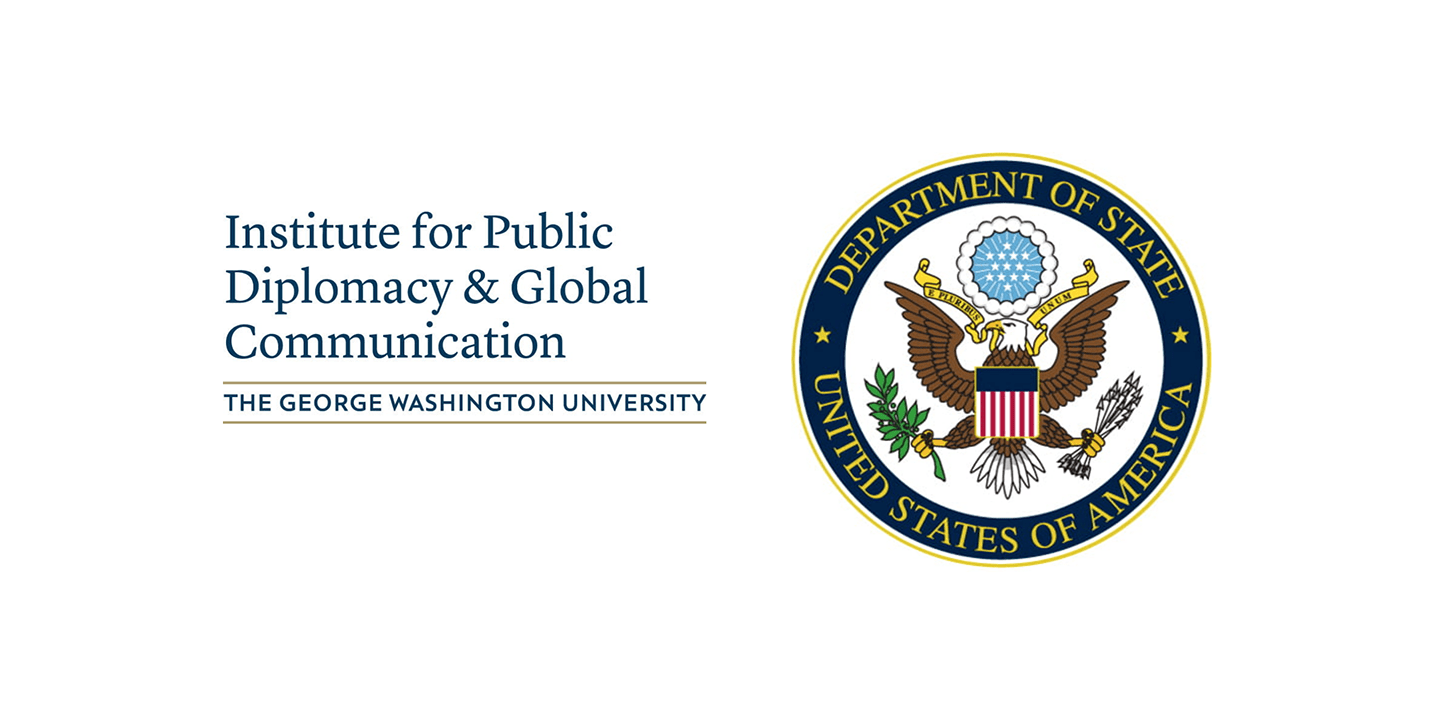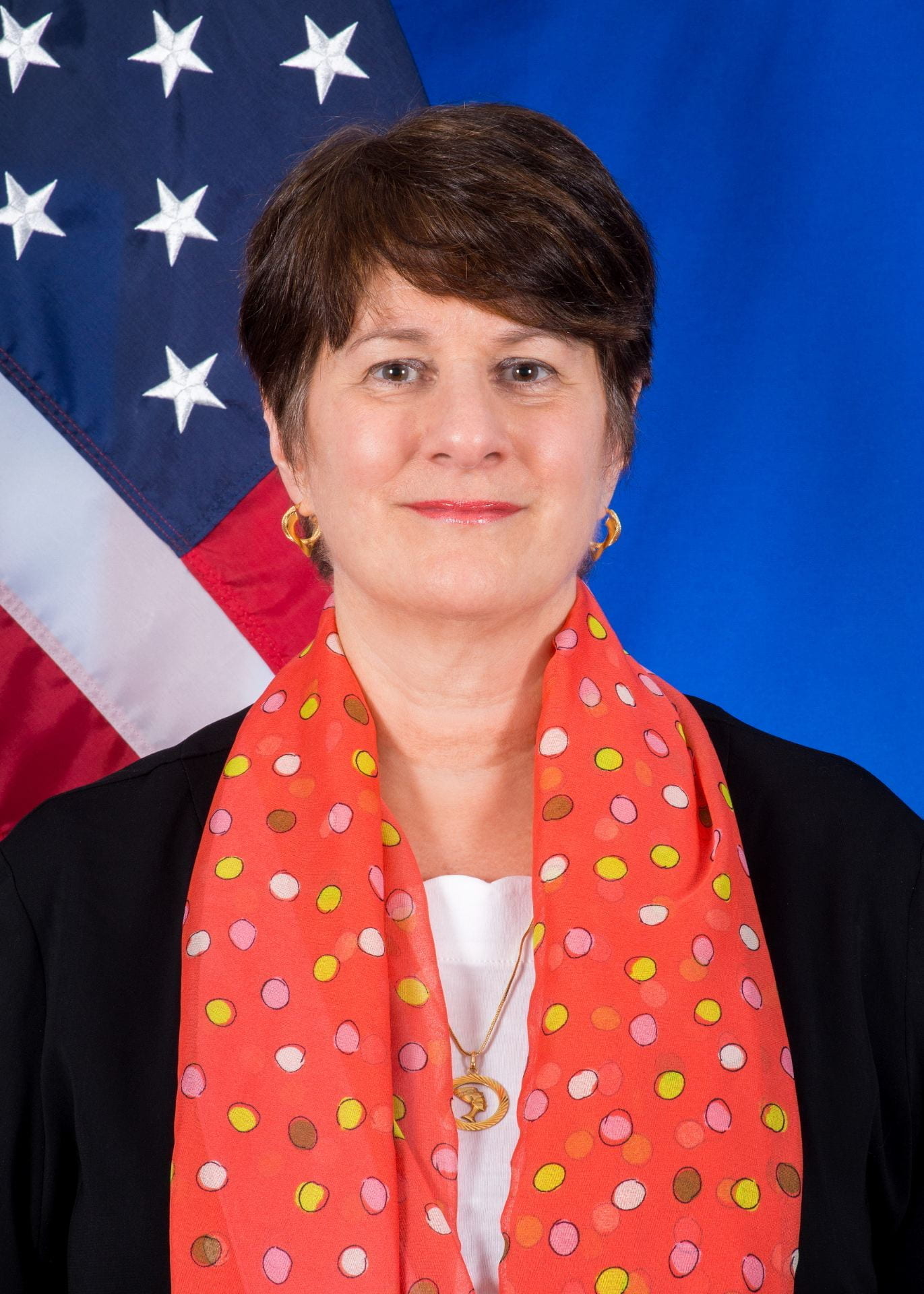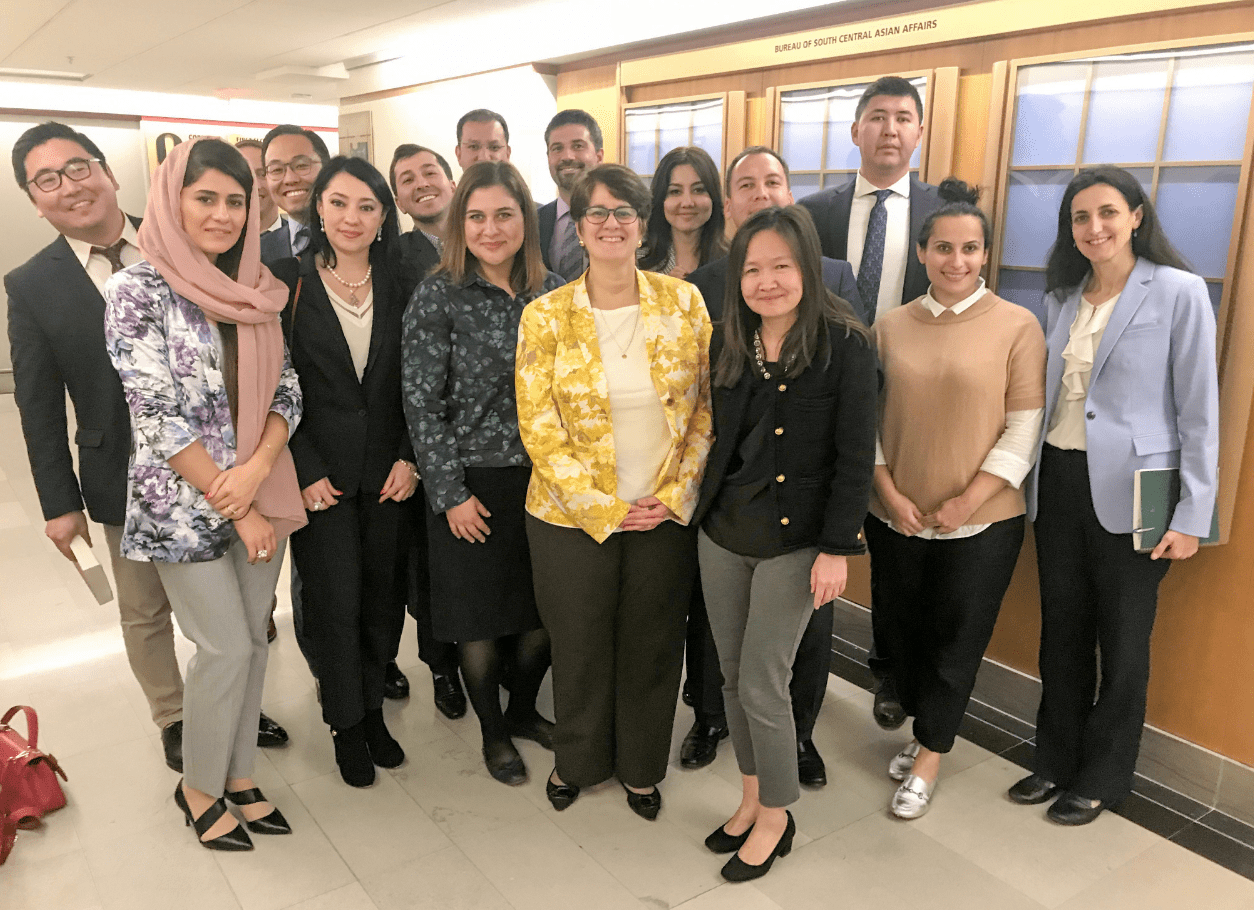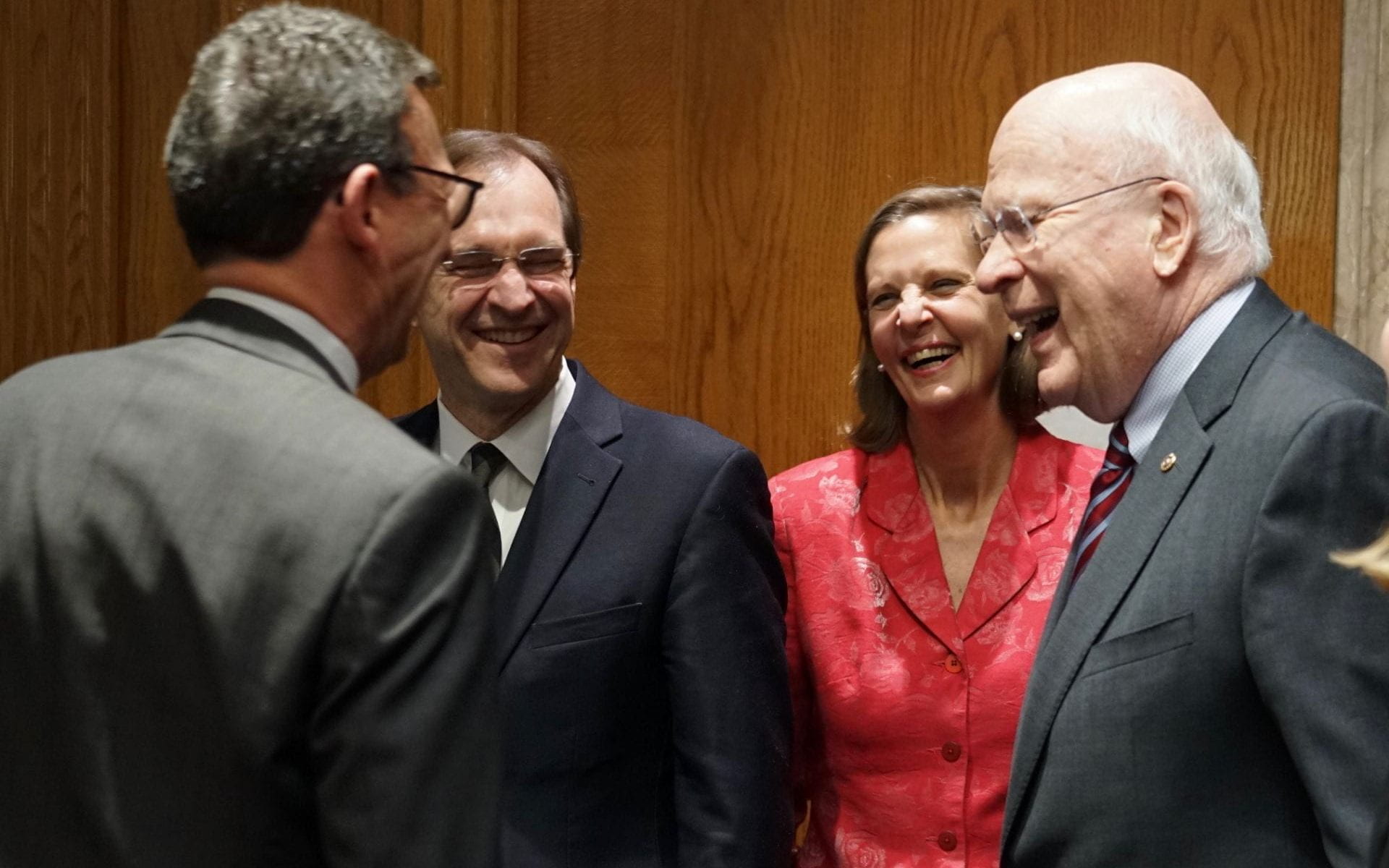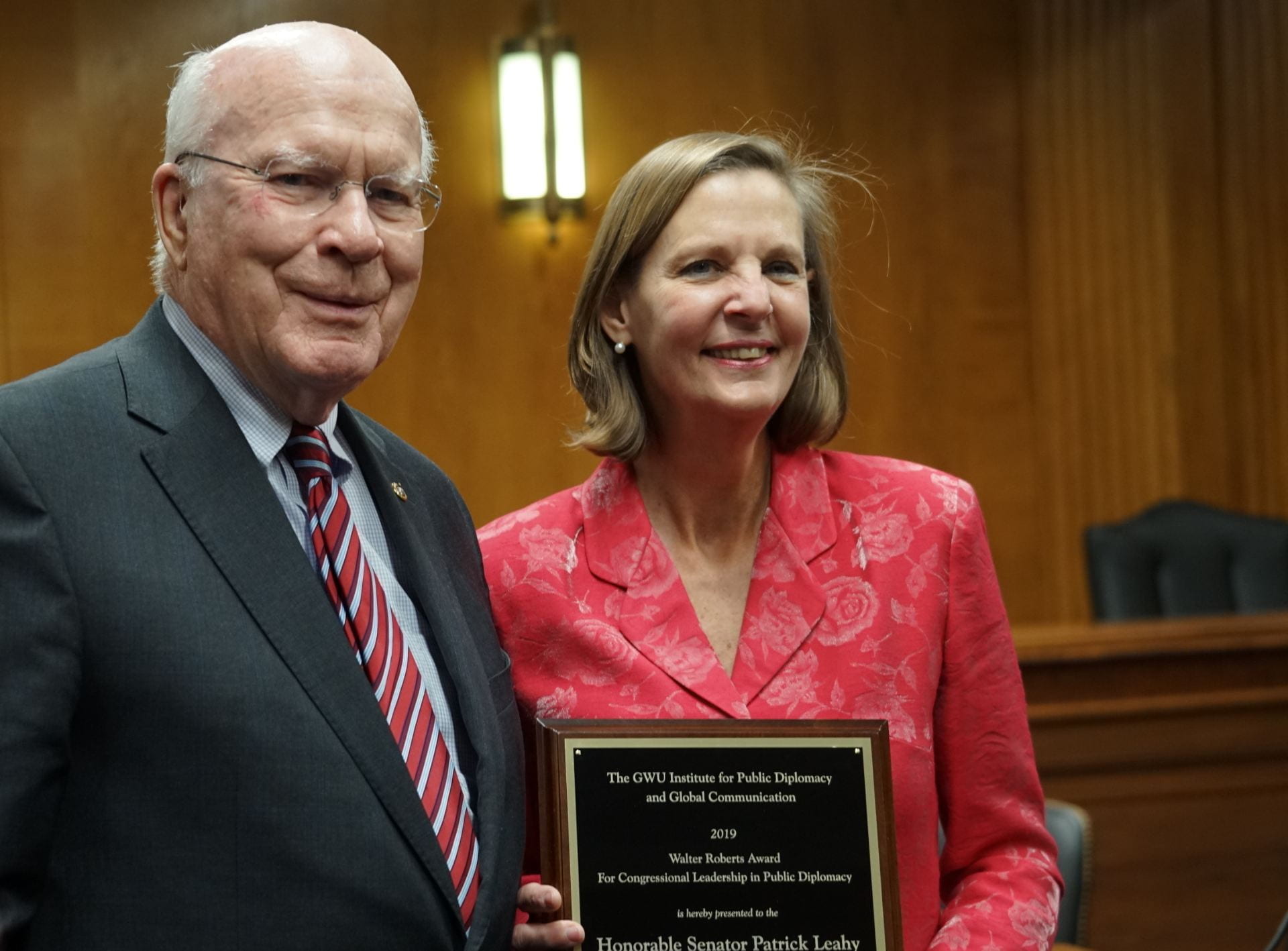Nick M. Brown, “The Peace Corps: Overview and Issues,” Congressional Reference Service, RS21168, updated June 26, 2019. This report, written with CRS’s usual balance and analytical precision, examines origins, objectives, activities, and current issues confronting the Peace Corps – described as “an agency of both international development and public diplomacy” that sends more than 7,000 American volunteers abroad annually to promote “world peace and friendship” at the grassroots level in 61 countries. Key issues include: (1) reductions in funding and volunteer participation, (2) failure to enact Peace Corps authorization legislation since 1999, (3) challenges in recruiting generalists and highly skilled professionals, (4) tradeoffs between development and public diplomacy goals, (5) the future of “Peace Corps Response” (a small program that recruits older volunteers), (6) streamlined recruitment and country assignment procedures, (7) systematic project development and evaluation, (8) volunteer safety and security, (9) systems for addressing sexual assaults on volunteers, (10) evacuation and program closure procedures, (11) volunteer health care during and after service abroad, (12) contested provisions on abortions in volunteer health benefit plans, (13) implementation of “third goal” activities that promote American’s understanding of other peoples, (14) post-service benefit legislation, (15) strengths and limitations of the five year rule for most Peace Corps staff, (16) partnerships with corporations and federal agencies, and (17) a proposed Peace Corps commemorative site in the District of Columbia.
“Cultural Diplomacy at the Front Stage of Canada’s Foreign Policy,” The Standing Senate Committee on Foreign Affairs and International Trade, Ottawa, Canada, 2019. This 102-page report focuses on realizing “the full potential of cultural diplomacy” as a central pillar in Canada’s foreign policy. It is based on extensive hearings the Senate Committee held with scholars, practitioners in cultural and arts communities, and officials in Canada and other countries. Its key recommendations call for: (1) Canada’s government to develop and implement a cultural diplomacy strategy that articulates objectives, roles and responsibilities, and identifies necessary budget resources; (2) greater collaboration with Canada’s provinces, territories, and municipalities; (3) development of performance measures to assess short-term and long-term results; (4) enhanced skills, knowledge, and tools to increase the cultural diplomacy capacity of Canada’s foreign missions and increased training for employees; and (5) creation of a modernized Canadian Studies Program. The report includes detailed discussions of the practice and benefits of cultural diplomacy as a category of foreign affairs practice, graphics, statistics on expenditures, and extensive bibliographic references.
William Davies, Nervous States: Democracy and the Decline of Reason, (W.W. Norton & Company, 2019). Davies (University of London) rests his central argument on two important 17th-century binaries – mind and body, war and peace — that he contends have weakened during the past century. He argues regarding the former that “advances in neuroscience have elevated the brain over the mind as the main way we understand ourselves, showing the importance of emotion and physiology to all decision-making.” Regarding the latter, new forms of violence (cyber warfare, non-state aggression) blur differences between war and law enforcement. In intermediate gray zones, Davies asserts, “lie nervous states, individuals and governments living in a state of constant and heightened alertness, relying increasingly on feeling rather than fact.” Experts and reason matter less; popular sentiment and emotion matter more. His book connects historical patterns with assessments of current phenomena: crowd behavior, the power of contagion, politics as virus, weaponizing everyday objects (cars, planes, and Facebook), narratives that account for suffering, public argument as a form of warfare, propaganda, language as a tool for domination, and uses and abuses of big data. More facts and reason won’t suffice, Davies writes in a brief concluding chapter. Experts and political leaders must pay more attention to the role of feelings in politics; understand voices of fear, pain, and resentment; “rediscover the political capacity to make simple, realistic, and life-changing promises;” generate policies predicated on treating everyone equally; and connect their words with experiences of citizens. The considerable strengths of this book are its insights into how we got here; more from Davies on implications of his call for greater attention to emotion going forward would be welcome.
Larry Diamond, Ill Winds: Saving Democracy from Russian Rage, Chinese Ambition, and American Complacency, (Penguin Press, 2019). Diamond (Stanford University), a leading scholar in democracy studies, examines the halt in democracy’s expansion propelled by elected leaders acting as agents of democratic destruction (Russia, Turkey, Egypt, Thailand, Kenya, Tanzania) and a wave of illiberal populism (Hungary, Poland, Brazil, the Philippines, and the United States). His causal factors include macro-trends creating anxiety over immigration and economic inequality, disastrous US interventions in the Middle East, President Trump’s embrace of dictators and disregard for democratic norms, and China and Russia’s use of “sharp power” to erode the integrity of civic and political institutions in democracies. His prescriptions: (1) recognize there is no technical fix for democracy promotion, (2) undertake a long-term effort with innovative and transparent methods in a new global contest of values and ideas, (3) reject turning inward and closing doors to foreigners, and (4) return to a democracy at home worthy of emulation.
Diamond urges Americans to reboot and greatly expand US “public diplomacy for democracy.” His proposals include (1) more Fulbright scholarships and other exchange programs, (2) expanded and accelerated US broadcasting, (3) achieving the promise of the State Department’s Global Engagement Center without “adopting the penchant for falsehood of the Kremlin and Trump,” (4) mass-produced democracy content flash drives, (5) translations of classic and modern works on democracy into multiple languages, and (6) new tools to open access to the internet in autocratic countries. Diamond endorses calls to create a “USIA on steroids,” quickly observing, however, that reviving a government entity “is never an easy political lift.” Like others in this terrain, he fails to discuss whether and how such an entity would be a good fit for 21st century whole of government diplomacy. See also Larry Diamond, “Democracy Demotion: How the Freedom Agenda Fell Apart,” Foreign Affairs, July/August 2019, pp. 17-25.
Kathy Fitzpatrick, Candace L. White, and Lindsey M. Bier, “C-suite Perspectives on Corporate Diplomacy as a Component of Public Diplomacy,” Place Branding and Public Diplomacy, May 2019. Fitzpatrick (American University), White (University of Tennessee), and Bier (University of Southern California) examine how corporate executives understand the concept and practice of so-called “corporate diplomacy” and the potential for public-private public diplomacy partnerships. Based on their interviews, the authors reach two broad conclusions. (1) Corporate communication officers have little interest in promoting national images, cultures, and values among foreign publics, and they perceive no obligation to support government public diplomacy objectives. Rather they seek to advance economic self-interest through creation of corporate identities and brands, and development of beneficial operating environments. (2) Nevertheless, opportunities exist for public diplomats to collaborate with corporations on issues that serve public and corporate interests such as food safety, education, disaster relief, and health care. Their article contains a literature review, analysis of relevant concepts and definitions in both corporate and diplomacy domains, assessments of implications of their findings, and suggestions for future research.
Greg Grandin, The End of the Myth: From the Frontier to the Border Wall in the Mind of America, (Metropolitan Books, 2019). The myth of endless promise in an apparently limitless frontier, Yale University historian Grandin writes, has long served as an explanation of US power and wealth, a safety valve for its social problems, and a foundation for Americans’ belief in their exemption from “nature’s limits, society’s burdens, and history’s ambiguities.” But now the frontier has closed. Expansion is no longer a viable symbol and solution. Donald Trump’s border wall, whether or not it is built, is an illusion that both recognizes and refuses limits, “an allegorical tombstone marking the end of American exceptionalism.” Time will tell whether Grandin’s thesis holds – and the extent to which a culture rooted in British colonial expansion and the primacy of individual, inherent rights survives demographic and social change. But he has written a sweeping and compelling account of America’s expansion: its wars, materialism, militarism, racism, displacement of indigenous peoples, politics, and foreign policies. Diplomacy scholars and practitioners who rightly lament America’s relative inattention to diplomacy and vastly disproportionate budgets for hard power instruments will find an abundance of explanations in Grandin’s insights and ideas.
Ellen Huijgh, Public Diplomacy at Home: Domestic Dimensions, (Brill, Nijhoff, 2019). Ellen Huijgh’s pioneering scholarship led the way to a new and deeper understanding of the domestic dimensions of public diplomacy as practiced by state, sub-state, and civil society actors. Her publications include numerous articles, editing and co-authoring a special edition of The Hague Journal of Diplomacy on “The Domestic Dimensions of Public Diplomacy,” and co-editing the Oxford Bibliographies Online 2013 edition of Public Diplomacy. She was affiliated with the Netherlands Institute of International Relations ‘Clingendael’ and a non-resident fellow at the University of California’s Center on Public Diplomacy. Her innovative work, transnational and cross-cultural, provides a foundation for future scholarship and debate on her thought-provoking ideas. Many thanks to Jan Melissen, Series Editor, Brill Diplomatic Studies, and Brill’s Irene Van Rossum for compiling this collection of her publications. Ellen was a friend and valued colleague of many readers of this list. Her untimely death in 2018 cut short a promising career, but she left us with important publications, valuable insights, and practice-oriented concepts that continue to gain traction.
Marian L. Lawson and Susan B. Epstein, “Democracy Promotion: An Objective of US Foreign Assistance,” Congressional Reference Service, CRS Report, R44858, updated January 4, 2019. CRS analysts Lawson and Epstein offer a concise and clearly written overview of democracy promotion activities funded by Congress and carried out by the State Department, USAID, the National Endowment for Democracy (NED), and other entities. Their report provides a succinct history of US democracy assistance, the roles of federal agencies and NED, past and present funding breakdowns by agency and categories of assistance, and key arguments made by democracy promotion’s critics and advocates. They conclude with brief assessments of issues for Congress to consider: the low priority given to democracy promotion by the Trump administration and the President’s frequent high praise for authoritarian regimes, proposed deep cuts in funding, effectiveness and oversight concerns, advantages and disadvantages of direct (USAID) and indirect (NED) approaches, the benefits of projecting democratic values relative to support for security and economic interests, and the implications of alternative governance models such as China’s “authoritarian capitalism.”
New Approaches to International History Series, Bloomsbury Academic. Edited by Thomas Zeiler (University of Colorado Boulder), this series focuses on new developments in international history “such as the cultural turn and transnationalism, as well as the classical high politics of state-centric policymaking and diplomatic relations.” The texts are written particularly for upper-level undergraduate and graduate-level students. Recent titles include: Michael L. Krenn, The History of United States Cultural Diplomacy, (2017); Daniel Gorman, International Cooperation in the Early Twentieth Century, (2019); Osamah F. Khalil, ed., United States Relations With China and Iran: Toward the Asian Century, (2019); and Asa McKercher, Canada and the World, (2019). Titles forthcoming in 2020 include Cyrus Schayegh, ed., Globalizing the U.S. Presidency: Postcolonial Views of John F. Kennedy, and Daniel Hucker, Public Opinion and 20th-Century Diplomacy. (Courtesy of Louis Clerc).
Peter Pomerantsev, This Is Not Propaganda: Adventures in the War Against Reality, (PublicAffairs, 2019). Pomerantsev (London School of Economics) follows his acclaimed Nothing is True and Everything Is Possible: The Surreal Heart of the New Russia (2014) with this global survey of what he describes as a “world of influence operations run amok, where dark ads, psyops, hacks, bots, soft facts, ISIS, Putin, trolls, and Trump seek to shape our very reality.” Woven into his narrative are memories of his dissident parents’ difficulties with the KGB in the Soviet Union, their emigration to West Germany and the United Kingdom, where his father worked with Radio Free Europe and the BBC World Service. His book combines memoir; stories of encounters with disparate actors seeking to weaponize information in Odessa, Manila, Mexico City, New Jersey, and elsewhere; and insights gleaned from his search for “sparks of sense” to present to “representatives of the waning Liberal Democratic Order.”
“Review of Allegations of Politicized and Improper Personnel Practices in the Bureau of International Organization Affairs,” Office of Inspector General (OIG), US Department of State, August 2019. State’s OIG reports on inappropriate practices in Department’s IO Bureau that “included disrespectful and hostile treatment of employees, accusations against and harassment of career employees premised on claims that they were ‘disloyal’ based on their perceived political views, and retaliation associated with conflicts of interest.” The OIG also found numerous employees had raised concerns. Department officials “counseled IO leadership,” but Assistant Secretary for IO, Kevin Moley, “did not take significant action to respond to such concerns.” See also Colum Lynch and Robbie Graemer, “State Department Watchdog Censures Two Trump Appointees for Harassing Career Staffers,” August 15, 2019, Foreign Policy; Alison Durkee, “Investigation Finds Political Purge Inside Trump’s State Department,” August 16, 2019, Vanity Fair.
Sophia Rosenfeld, “Truth and Consequences,” The Hedgehog Review, Summer 2019, 18-24. Rosenfeld (University of Pennsylvania) makes every word count in this elegant essay on episodic struggles over what constitutes truth and who gets to say so. Messy disagreements leading to minimal agreement on what reality looks like have been baked into democratic politics since the origins of modern democracy in the 18th century. Today’s “truth” crisis is not new to the extent it rests on contests over what constitutes “serviceable truth” between cohorts with different relationships to knowledge and virtue – elites enabled by education, training, and varieties of privilege and “real” people informed by faith, instinct, and practical experience. What is new is the growing inability of people in epistemic tribes, fueled by information hyper-abundance, to agree that truth, however elusive, matters as collective aspiration. She pleas for determined effort, within a framework of pluralism, “to find some elemental convictions about the nature of reality that we can hold in common.”
Kori Schake, “Back to Basics: How to Make Right What Trump Gets Wrong,” Foreign Affairs, May/June 2019, 36-43. In this essay, Schake (International Institute for Strategic Studies), after general observations on grand strategy, offers thoughts on “diplomacy done right.” Her recipe for change: (1) return to incorporating liberal values in foreign policy; (2) set up allies to succeed and give them credit when they do; (3) stop “fetishizing” the military and its mission creep in diplomacy based on a vast resource advantage; and (4) implement a major overhaul of the Department of State. Schake’s brief list of interesting ideas on recruitment, training, and overseas deployment at State call for elaboration and debate.
Paul Sharp, Diplomacy in the 21st Century: A Brief Introduction, (Routledge, 2019). Sharp (University of Minnesota Duluth) has written a clear, teachable, and valuable book. His intent is twofold: (1) to explain diplomacy, its origins, concepts, and practice, and (2) to advocate for the increasing importance of diplomats and their work today. In part one, he provides basic ideas about diplomacy as a distinct form of human relations, entities and people that engage in diplomacy, why diplomats matter, and principles of diplomatic practice and success. He develops a core distinction between diplomacy of managing relations and the diplomacy of solving problems. In today’s uncertain world, he argues, we need greater attention to the diplomacy of relations. In part two, after a short discourse on the risks of using “bad” as an evaluative term in assessing moral character, professional competence and consequences for others in diplomacy, he discusses the diplomacy of bad leaders, bad media, and bad followers. In part three, he concludes with an assessment of diplomacy and bad diplomats.
Particularly useful is his treatment of how public diplomacy responds to increasingly differentiated publics and the disaggregated state – and the dissolution of boundaries between public diplomacy, diplomacy, international relations, and domestic relations. Sharp draws on foundational ideas in his masterful pioneering study, Diplomatic Theory of International Relations (2009). His new book puts his theoretical ideas in a form that is highly accessible to undergraduate and graduate students and to practitioners in diplomacy training courses: fresh prose, enumerated learning objectives, a glossary of terms, and numerous boxed illustrative cases, most drawn from today’s issues. Sharp and other diplomacy scholars are providing excellent instructional material. If only IR and communication departments could overcome their pervasive reluctance to offer courses on diplomacy as a field of study and practice. If only.
“Strengthening the Department of State,” The American Academy of Diplomacy, May 2019. This 73-page report, drafted by Robert M. Beecroft and John Naland, the Academy (self-described as an “association of former US senior ambassadors and high-level government officials”) looks at ways to “better identify, recruit, train, support, equip, and protect State’s people.” In contrast to previous reports that focused primarily on the Foreign Service and what it describes as the “traditional work of diplomats – policy recommendations, reporting, and negotiations,” the Academy focuses here on the State Department’s “rigid, frustrating” Civil Service system. One key recommendation is a pilot project to create “an excepted rank-in-person model for part of the Civil Service,” with “up or out” promotion criteria, which would be “supplemented by robust rotation and development policies, a more meaningful evaluation process, and mandatory leadership training.” (Although sensitive to the need for employee buy-in for this pilot project, the report makes no mention of USIA’s attempt in the 1970s to create a mandatory “up or out” system for its Civil Service employees, which the Agency eventually terminated after successful litigation by its employee union.) The report also makes recommendations to strengthen three categories of Foreign Service Specialists: office management, information technology, and diplomatic security. Importantly, the Academy renews its compelling recommendation made for career-long professional education for Foreign Service and Civil Service employees, comparable to what is required by the military, the law, and “every other endeavor with a claim to professionalism.”
“USAGM 2018 Annual Report,” August 2019, US Agency for Global Media (USAGM). This report from the rebranded USAGM (formerly the Broadcasting Board of Governors) provides information on the programs, audience levels, budgets, strategies, and media environments of the federal Agency’s five networks: Voice of America, Radio Free Europe/Radio Liberty, the Office of Cuba Broadcasting, Radio Free Asia, and the Middle East Broadcasting Networks. According to USAGM’s CEO John Lansing, USAGM “made the most significant progress yet in our transformation into a modern and nimble media enterprise.” In a report long on proclaimed achievements and short on critical self-examination, Lansing gives particular emphasis to “our largest audience growth ever – a jump from 278 million in 2017 to a total of 345 million in 2018.” For a thoughtful critique of USAGM’s presentation of its audience numbers, see Kim Andrew Elliott, “The USAGM Audience Increase: Less Startling Than Meets the Eye,” March 27, 2019, CPD Blog, USC Center for Public Diplomacy.
Recent Blogs and Other Items of Interest
Phillip C. Arceneaux, “Information Intervention: The Mending of a Fractured Paradigm,” July 22, 2019, CPD Blog, USC Center for Public Diplomacy.
Erin Banco, “Influence Peddling, Double-Dealing, and Trumpworld Swampmen: How U.S. Plans for the World’s Fair Fell Apart,” August 20, 2019, Daily Beast.
Martha Bayles, “Reality Made Me Do It,” Summer 2019, The Hedgehog Review.
Corneliu Bjola, “How Digital Propaganda May Affect EU Elections 2019: The Good, the Bad, and the Ugly,” May 21, 2019, CPD Blog, USC Center for Public Diplomacy.
“Bureau of Global Public Affairs,” 2019, US Department of State; Joe Johnson, “Evolution of Public Diplomacy One Mutation at a Time,” April 15, 2019, Public Diplomacy Council; “Carol Morello, “State Department to Take a Step Into the Digital Age in Effort to Counter Disinformation,” April 12, 2019, The Washington Post.
“The Competition for Collaboration,” May 2019; “The Shape of Global Higher Education: International Comparisons With Europe,” May 2019, British Council.
“Congressional International Exchange and Study Caucus,” Dear Colleague Letter, Reps. James A. Himes and Robert W. Bishop,” August 2019, Courtesy of Alliance for International Exchange.
“A Europe That Protects: EU Reports on Progress in Fighting Disinformation Ahead of European Council,” June 14, 2019, Press Release, European Commission.
“Foreign Relations Reauthorization: Background and Issues,” June 27, 2019, In Focus, Congressional Research Service. CRS, June 2109
Cory R. Gill and Edward J. Collins-Chase, “U.S. Overseas Diplomatic Presence: Background and Issues for Congress,” June 6, 2019, IF 11242, Congressional Reference Service.
Susan Glasser, “Mike Pompeo, The Secretary of Trump,” August 19, 2019, The New Yorker.
Robbie Gramer, “Diplomats Losing Out to Trump Picks for Top Spots,” August 15, 2019, Foreign Policy.
Erica L. Green, “Visa Delays at Backlogged Immigration Service Strand International Students,” June 16, 2019, The New York Times.
Naima Green-Riley, “Huawei’s ‘Teachable Moment’ on Public Diplomacy,” May 21, 2019, Geopolitical Monitor.
Alan Heil, “A Struggle for Minds in Closed Societies: a Radio Free Asia Update,” August 12, 2019, Public Diplomacy Council.
“H.R. 2159: Public Diplomacy Modernization Act of 2019,” April 9, 2019, Govtrack.us.
“H.R. 3571: City and State Diplomacy Act,” June 27, 2019, Govtrack.us.
Dan Hurley, “Was It An Invisible Attack on U.S. Diplomats or Something Stranger,” May 15, 2019, The New York Times Magazine.
Lynda Jessup, “Cultural Diplomacy: Bridging the Study-Practice Gap,” June 4, 2019, CPD Blog, USC Center on Public Diplomacy.
Olga Krasnyak, “Strategizing Science Diplomacy,” May 16, 2019, CPD Blog, USC Center for Public Diplomacy.
Richard Lebaron and Sarah Aljishi, “The Decline of MENA Students Coming to the United States: Why That’s a Problem,” June 13, 2019, Atlantic Council.
Ilan Manor, “How America Uses Instagram to Indict Iran,” July 5, 2019, USC Center on Public Diplomacy, CPD Blog.
Jacob McCarty, “Cities Are The Future: We Need To Coordinate Their International Diplomacy,” July 29, 2019, The Hill.
Tom McTague and Prashant Rao, “Leaks Are Changing How Diplomats Talk,” July 18, 2019, The Atlantic.
Carol Morello, “Some U.S. Embassies Still Hoisting Rainbow Flags Despite Advisory From Washington,” June 8, 2019, The Washington Post.
Matias J. Ocner and Nora Gamez Torres, “Doctors Found Changes in the Brains of Diplomats Allegedly Attacked in Havana,” July 23, 2019, The Miami Herald.
Chuck Park, “I Can No Longer Justify Being a Part of Trump’s ‘Complacent State.’ So I’m Resigning,” August 8, 2019, The Washington Post.
James Pamment, “Sports Stars & Soft Power: New Takes on Sports Diplomacy,” April 13, 2019, CPD Blog, USC Center on Public Diplomacy; “Special Issue: Sports Diplomacy,” September 2019, Place Branding and Public Diplomacy.
Champa Patel, “Embrace Soft Power (But Recognize Its Limits),” June 12, 2019, Chatham House.
“Rethinking America’s Approach to the World,” August 18, 2019, Editorial, The New York Times.
Kori N. Schake and Brent McGurk, “Compete With China? Support a GI Bill for Diplomacy,” May 13, 2019, The Washington Post.
Rod Schoonover, “The White House Blocked My Report on Climate Change and National Security,” July 30, 2019, The New York Times.
Lara Seligman, “US Military Slashes Foreign-Language Training: The Cut To Immersion Programs Comes As the Pentagon Redirects Resources To Trump’s Border Wall and Reduces America’s Troop Presence Overseas,” May 13, 2019, Foreign Policy.
Neely Tucker, “Inquiring Minds: Ryan Semmes (Re journals of US diplomat Benjamin Moran, 1853-1874),” June 17, 2019, Library of Congress Blog; “Benjamin Moran Journals, 1851-1875,” Library of Congress Manuscript/Mixed Formats (Collection).
Elizabeth Warren, “Revitalizing Diplomacy: A 21st Century Foreign Service,” June 28, 2019; Rishka Dugyala, “How Elizabeth Warren Would Bolster US Diplomacy,” June 28, 2019, Politico.
Huizhong Wu, “Move Over Trump: China’s Tweeting Diplomats Open Fresh Front in Propaganda Fight,” July 16, 2019, Reuters.
Gem From The Past
Thomas Carothers, Aiding Democracy Abroad: The Learning Curve, (Carnegie Endowment for International Peace, 1999). Carothers, the Carnegie Endowment’s Vice-President for Studies, has long been a leading authority on democracy promotion, human rights, and governance. As the above reading list shows, democratization today faces strong “ill winds” in a liberal world order now under assault from creeping authoritarianism and viral strains of populism grounded in nativism and grievance politics. Two decades ago, Aiding Democracy Abroad was a landmark addition to Carothers’ many books and articles that combine penetrating arms-length analysis with deep knowledge of the work of US practitioners (notably USAID, the National Endowment for Democracy, and its grantees) and democracy practitioners abroad. Its insights, developed at the crest of democracy’s so-called “third wave,” still illuminate. Carothers steers a path between democratization’s skeptics and uncritical enthusiasts. He examines historical patterns and the strategies, tools, and methods used by government and civil society practitioners. Case studies support his evidence-based assessments of conceptual shortcomings and lessons learned from hands-on experience. Democratization’s context has changed substantially, but Carothers’s persuasive call for democratizers to pay heed to power and interests – from perspectives “based on idealistic aspirations tempered by realistic considerations” – remains highly relevant.
